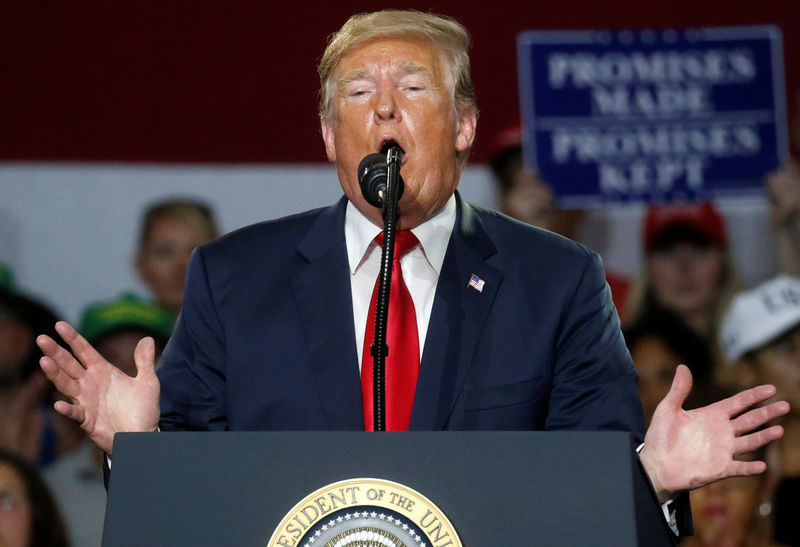 © Reuters. U.S. President Donald Trump holds a Make America Great Again rally in Olentangy Orange High School in Lewis Center, OH, U.S.
© Reuters. U.S. President Donald Trump holds a Make America Great Again rally in Olentangy Orange High School in Lewis Center, OH, U.S.SHANGHAI (Reuters) – A Chinese state newspaper on Tuesday described as “wishful thinking” U.S. President Donald Trump’s belief that a fall in Chinese stocks was a sign of his winning the trade war and an example of his “ability to elasticize the truth.”
The commentary in the official China Daily comes as rhetoric in state media, which is actively controlled by Beijing, has taken an increasingly aggressive stance against Trump, a shift from their previous approach, which mostly limited direct criticism to U.S. policies.
On Monday, the Communist Party’s People’s Daily newspaper singled out Trump, saying he was starring in his own “street fighter-style deceitful drama of extortion and intimidation”.
China proposed retaliatory tariffs on $60 billion worth of U.S. goods ranging from liquefied (LNG) to some aircraft on Friday, following a proposal by the administration of U.S. President Donald Trump for a higher 25 percent tariff on $200 billion worth of Chinese imports.
The paper referred to a Saturday Tweet by Trump which said “Tariffs are working far better than anyone anticipated. China market has dropped 27 percent in last four months.”
China’s stock market was performing poorly before the administration’s tariff attack, said the China Daily, and is due in part to Beijing’s attempts to cut corporate debt.
The U.S. trade deficit climbed $3 billion to $46.3 billion in June, the first increase in four months, the U.S. Commerce Department said on Friday, undermining Trump’s claim that “tariffs are working big time” said the paper.
Trump has repeatedly criticized China for its trade deficit with the U.S., which he feels is a sign of unfair trade practices.
Despite the tariffs, China’s exports are expected to have grown in July, according to a Reuters poll of economists.
Fusion Media or anyone involved with Fusion Media will not accept any liability for loss or damage as a result of reliance on the information including data, quotes, charts and buy/sell signals contained within this website. Please be fully informed regarding the risks and costs associated with trading the financial markets, it is one of the riskiest investment forms possible.
Source: Investing.com



























